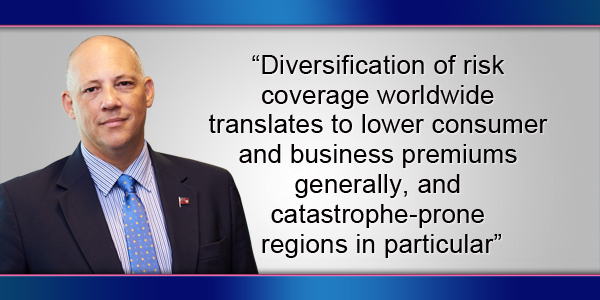Column: Storms & Bermuda-Based Re/Insurers
[Opinion column written by Ross Webber]
Thirty years ago, Hurricane Emily hit Bermuda. She was a Cat 1 storm—and the first major tempest of its kind that many islanders can remember. The previous hurricane that strong was back in 1948. Emily made landfall on September 25, 1987, packing 90-mile-per-hour winds, gusts up to 112, and even a few tornadoes.
Emily’s impact was all the more dramatic because she pre-dated the era of preparedness that makes the modernday Bermuda community so resilient. Meteorology hadn’t evolved to its cutting-edge prescience. There was no Emergency Measures Organisation.
Neither forecasters nor islanders could approximate the path or strength of the storm, which uprooted trees, flipped cars, sank boats, and tore the roofs off 230 Bermuda buildings, including the airport, which had to close temporarily. Many residents were injured due to Emily’s extreme winds that caused damage totalling $50 million.
Fast-forward to 2017, when another Emily, this time only a tropical depression, reminded us of her namesake as she rained out parts of Cup Match week—and set in motion an Atlantic storm season that has turned out to be unprecedented in its intensity and resulting devastation.
Hurricanes Harvey, Irma and Maria have wreaked havoc not only on our neighbours to the south and west, but also on the global insurance industry, where observers say some of the early figures for predicted losses [$100 billion-plus] could be game-changers.
Concrete tallies on claims remain murky. Our market, like other major insurance industry hubs, will have to await the fiscal outcome—from Texas, Florida, Puerto Rico and other hard-hit territories in the Caribbean. Yet Bermuda’s substantial value to communities and economies trying to recover and rebuild should be crystal clear.
Conservative estimates already underscore the significant share of claims the island’s carriers will pay out for the first two hurricanes; of $60 billion in estimated insured losses attributed to Harvey and Irma, the Bermuda market will cover somewhere in the region of $15 billion, nearly a quarter.
That speaks volumes about Bermuda’s economic importance as an international financial centre, and the absolute need for foreign insurance as a whole.
Diversification of risk coverage worldwide translates to lower consumer and business premiums generally, and catastrophe-prone regions in particular. That’s the whole point of insurance. Should the burden of stratospheric costs for a record-breaking storm like Irma have to fall squarely on the pocketbooks of Floridians alone?
The timing for spreading that message far and wide is neatly coincidental, as several potential storms—of the geopolitical variety—take shape on both sides of the Atlantic.
Decisions on a European Union [EU] rating of cooperative, tax-transparent jurisdictions is slated to happen later this year, with a blacklist threatened for certain nations.
It was particularly revealing to see statistics this week that heavily underscore our island’s real economic worth to EU communities. Figures released by the Bermuda Monetary Authority [BMA] show Bermuda reinsurers paid out over $70 billion to EU policyholders and cedants over the past 20 years. One might hope that would be sufficient for Brussels to recognise Bermuda’s tangible contribution to economic stability.
Similarly, the Trump Administration is finally putting meat on the bones of what may prove to be a challenging US tax-reform plan. In their much-anticipated framework released Wednesday, Republicans took aim at offshore business with elements of the draft plan zeroing in on foreign profits of US multinational corporations, as well as referencing tax rates for “specific businesses.”
Will Bermuda-based re/insurers be affected? It’s far too early to tell, as the plan will now have to be finessed by congressional committees. But prudent policymakers will understand that in trying to “level the playing field” for US business by targeting centres like Bermuda, they effectively place US taxpayers on the hook when the next Harvey or Irma strikes.
Ross Webber is CEO of the Bermuda Business Development Agency [BDA.bm], an independent, public-private partnership working to attract investment and maintain business on the Island.
20 Most Recent Opinion Columns
- 12 Sep: Column: Is It Time To Start Downsizing?
- 05 Sep: Column: Beauty Is More Than Skin Deep
- 30 Aug: Column: Law Firms & Cyber Security
- 24 Aug: Column: Richards, JetGate, Lessons To Learn
- 20 Aug: Diet & Nutrition To Combat Chronic Diseases
- 15 Aug: Column: Plan On Leaving An Inheritance?
- 11 Aug: Column: ‘Overwhelming Mandate To Govern’
- 09 Aug: Column: Social Media & Lawyers: Why So Afraid?
- 06 Aug: Column: Jurisdictional Advocacy Beyond Politics
- 06 Aug: Column: Creating A Human Tan Inside The Lab
- 01 Aug: Column: Optimizing Potential Of This Generation
- 30 Jul: Column: Key To Enjoying A Stress-Free Holiday
- 25 Jul: Column: Transformation, Goodbye Time Sheets
- 18 Jul: Column: Economic Growth Is Important
- 16 Jul: Column: What Can An Independent MP Do?
- 16 Jul: Column: What Julian Stood For, Father’s Legacy
- 16 Jul: Column: Who Do You Want To Manage Money?
- 14 Jul: Column: ‘Open Letter’ To Nelson Mandela
- 12 Jul: Column: Will We Need Lawyers By 2050?
- 10 Jul: Column: Growing Pains Of A Young Democracy
Opinion columns reflect the views of the writer, and not those of Bernews Ltd. To submit an Opinion Column/Letter to the Editor, please email info@bernews.com. Bernews welcomes submissions, and while there are no length restrictions, all columns must be signed by the writer’s real name.
-



